They lived in extreme poverty. They were despised by the peasants, they were not respected by the nobility. They worked in cramped, moldy rooms full of rats and cockroaches. Some lived in stables, others were almost starving. Believe us - you wouldn't want to be 19th century ...
As reported by "Gazeta Warszawska Sądowa", in September 1875 teacher appears before the St. Petersburg court X. The indictment reads: X, summoned to a private house, started giving lessons, and then (...) stole various items worth over a hundred rubles. sr.
Despite the obvious guilt, after hearing the accused and the testimony of jury witnesses, they release him from judicial responsibility. Nay! They make a contribution and hand the thief 150 silver rubles . The audience present at the trial conducts its own collection and the next coins end up in the defendant's pocket! After the trial, teacher X sat on a bench in the corridor for a long time before he regained consciousness and was able to calm down completely .
Mitigating circumstance
According to the "Code of Penal and Correctional Penalties" in force at that time, theft of items with a value not exceeding 300 rubles was punishable by the penalty of deportation to the Tomsk or Tobol guberniya, flogging in the amount of 50 to 60 times and putting them to prisoners on time from one to two years.
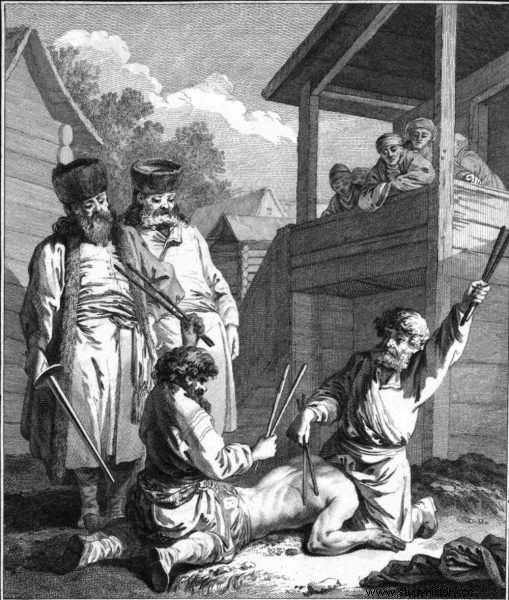
Instead of a severe punishment, teacher X received a lot of money from the court. He certainly did not expect such a turn of events ... In the illustration, Jean-Baptiste Le Prince's drawing "Punishment of the Whips" (source:public domain).
The victim was saved by Art. 7 of the Code about a mitigating circumstance, which in this case was: committing a crime only because of severe poverty and the complete lack of a way to maintain a life and a decent income.
Works from morning till night, eats dry bread
The owner of the house, who rents the premises to the teacher and his wife, testifies during the trial:
Teacher X. and his family rent a flat from me, for which he pays 7 rubles in silver per month. I am a witness to the misery in which these people find themselves. Sometimes I come to them and I never see his wife cooking food. I suppose they only eat dry bread . This lady never goes anywhere, because she has nothing to wear. Teacher X also dresses very modestly, as he cannot afford a more proper outfit. Let me also add that this man works all day , from morning to evening.
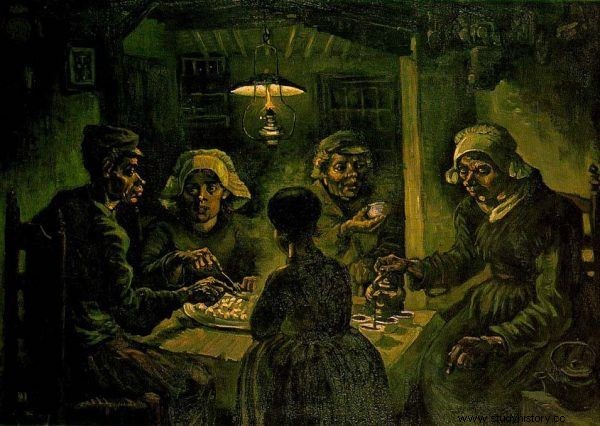
The image of teacher X's misery, emerging from the testimonies of witnesses, moved the jurors and the trial audience to tears. The illustration shows Vincent van Gogh's painting "The Potato Eaters" (source:public domain).
The landlady's version is confirmed by other witnesses and the accused himself. The picture of the defendant's living conditions (...) was so emotional that many of the jurors had tears in their eyes and a significant part of the large audience cried with bitter tears.
Dirt, stench and poverty, or 19th century education
Were the judges and audience fooled by a clever cheater? Maybe the hostess was exaggerating? None of these things. Teacher X's situation was not unique . His colleagues in the Russian Empire, including Congress Poland, as well as on Polish lands in the Austrian and Prussian partition, also did not have to put a pot into the pot.
Ba! If the situation of a teacher in Warsaw were to be different from that of a pedagogue from St. Petersburg, it would only be worse! The tsarist authorities, to put it mildly, were not conducive to the development of Polish education. The Warsaw curator, Paweł Muchanow, even ordered the construction of new and renovation of existing schools to be hindered.
As a result, the average classroom in the Kingdom of Poland showed the following picture: rotting furniture, vermin, fungus and rats . And, of course, the image of the tsar in a golden frame, adorning the dirty wall.
The door was broken, the oven was not allowed to smoke, in the middle of the room there was a pit for potatoes covered with a wooden flap, ten benches were all the furniture, because the teacher's table and chair were used for fuel in winter - describes one of such rooms by the historian and educator Ryszard Wroczyński.
The classes of Galician schools looked similar. In the Grand Duchy of Poznań, some improvement took place in the 1880s, when the authorities began to subsidize the construction and renovation of schools. But it was then that lessons were held in musty hovels, and the rural teachers' sleeping quarters were often not even separate from the stables.
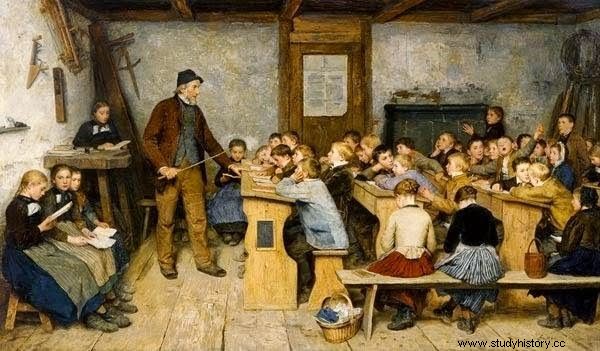
Overcrowded, unheated classrooms, often with a mushroom and cockroaches - these were the working conditions of a 19th-century teacher (source:public domain).
Teacher - parasite, whipping boy
To say that the teaching profession in the nineteenth century was not universally respected is to say nothing. Especially in the villages, peasants behaved aggressively, distrusted teachers and were reluctant to pay school fees. They did not understand why they had to keep a parasite who gets his wages "in vain." Because if they couldn't write and count themselves, why would their children need it?
The teachers were also not appreciated by the nobility. The heirs believed that educating the people was no good, so they treated elementary school staff, if not hostile, then at least with contemptuous indifference .
Education workers were often accused of immoral conduct, lack of religion, ignorance and incompetence. In Congress Poland, some improvement occurred after the school reform of 1869, but the general opinion of the general public about teachers did not change for a long time - they were still classified as second-class citizens who, for example, were not allowed to participate in municipal elections.
Teacher - painter, plasterer, acrobat
Starvation wages were not enough to support me. The teachers had to take extra work to make ends meet. In 1814, in the Duchy of Warsaw, teaching of church music and singing was introduced to teachers' seminars, so that it was easier for the graduate to find employment as an organist.
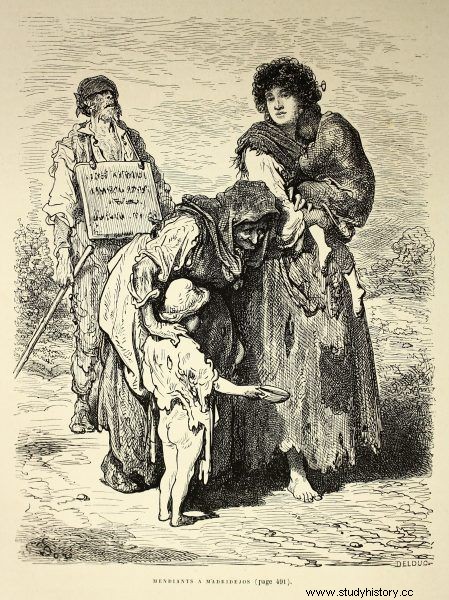
Could a 19th-century teacher family look like this? (author:Gustave Doré, license:CC BY 2.0).
All jobs were caught - "educators" worked in courts and offices, they were church clerks and communal writers, they even dealt with beekeeping! However, additional teachers' classes were regulated - the inspector's consent was needed. Work in trade, crafts or, for example, entertainment in inns and at weddings was also forbidden. There were times when desperation drove some teachers to beg. . Or, as in the case of our hero, to be stolen.
Wretched life of Mr. X.
The scant information from the process of teacher X does not allow to determine the amount of his earnings. He was probably an hourly teacher. It is known that a teacher at the city school 50 years earlier received 160 rubles a year. At the time of Mr and Mrs X, this would have been a small amount indeed.
The teacher for primary education was ready to work for 200 rubles a year already in the times of Mr. X.. It can be presumed that the teacher could have earned an income of around 300 rubles for the year , which is about 25 rubles a month.
Is it a lot or a little? To recreate the realities of the life of teacher X and others like him, we reach for the 1876 edition of Kurjer Warszawski. First of all - we are looking for an apartment. There is an announcement:two rooms for 37 rubles 50 kopecks, payable every three months, that is, more than 12 rubles every month. Another option? Five rooms for 500 rubles in silver a year - that's way too much. Maybe a room with a hall? Cost only 10 rubles per month.
Mr. X only paid 7. This proves the low standard of the premises. But thanks to this after paying the rent he had 18 rubles left.
There were probably no children, no one mentioned them during the trial. Feeding two people is another, constant expense. At that time, a dinner in a restaurant cost about 30 kopecks, a glass of tea with a roll - 3 kopecks. With two people, eating out more than one meal a day in a month would take up most of your annual salary.
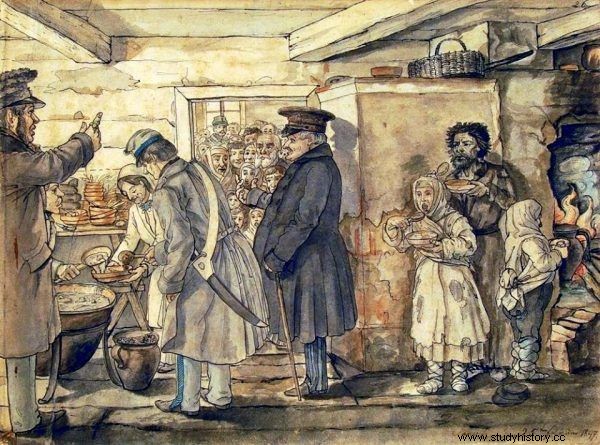
More than one 19th-century teacher would be eager to get a free bread ... (source:public domain).
Maybe it's better to cook at home. Beef was about 6 kopecks per pound, pork was 8 kopecks, and you can make dinner for at least two days. Bucket of potatoes - 9 kopecks, loaf or wholemeal bread - 2 kopecks pound. You can survive on potatoes and bread alone, and it will still eat up most of your monthly budget.
And not just bread ... So a pint of beer - 10 kopecks, the pleasure of a cigar is 3 kopecks, 100 cigarettes - one ruble in silver, a quart of excellent rye vial ... enough, we reach too far. Just 44 kopecks for information.
Let's add a ruble for a square of coal (it's about 10 buckets) and some wood, a tenth of a pile for a ruble and a half. If the teacher or his wife fancied to wash themselves, the soap cost 25 kopecks.
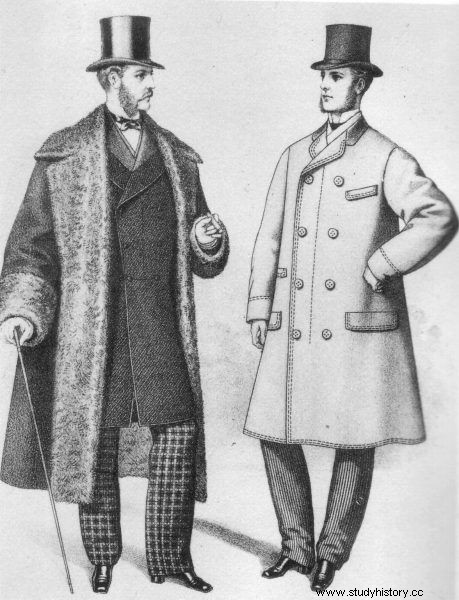
The appearance of the British gentleman was far beyond the reach of teacher X's wallet. Even buying the cheapest clothes was a financial challenge ... (source:public domain).
Although the landlady said during the trial that her tenant dressed modestly, she would still have to spend about 8 rubles on a jacket. For this vest - less than 2 rubles, pants for 3 and a shirt for one and a half. You could get shoes for 6 rubles, and boots for 4. A winter coat is a considerable expense of a dozen or so rubles. In total, it is a good deal, even if it is a purchase for a year or even several years.
It is quite possible that Mr. X. was earning even less than we assumed. One thing is certain - the teacher's salary could only be (and hardly) vegetated . And although the court case ended with a happy end, the teacher's further fate could not be colorful. The amount offered to him was probably only enough for a few months. Despite the acquittal, it must have been difficult for him to find an employer. The theft has occurred and X. has abused the trust placed in him.
